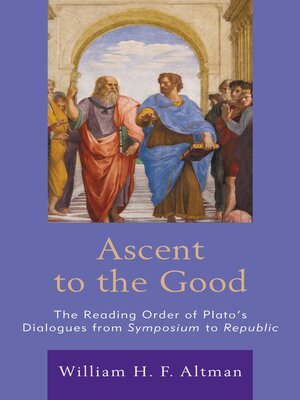Ascent to the Good
ebook ∣ The Reading Order of Plato's Dialogues from Symposium to Republic
By William H. F. Altman

Sign up to save your library
With an OverDrive account, you can save your favorite libraries for at-a-glance information about availability. Find out more about OverDrive accounts.
Find this title in Libby, the library reading app by OverDrive.



Search for a digital library with this title
Title found at these libraries:
| Library Name | Distance |
|---|---|
| Loading... |
At the crisis of his Republic, Plato asks us to imagine what could possibly motivate a philosopher to return to the Cave voluntarily for the benefit of others and at the expense of her own personal happiness. This book shows how Plato has prepared us, his students, to recognize that the sun-like Idea of the Good is an infinitely greater object of serious philosophical concern than what is merely good for me, and thus why neither Plato nor his Socrates are eudaemonists, as Aristotle unquestionably was. With the transcendent Idea of Beauty having been made manifest through Socrates and Diotima, the dialogues between Symposium and Republic—Lysis, Euthydemus, Laches, Charmides, Gorgias, Theages, Meno, and Cleitophon— prepare the reader to make the final leap into Platonism, a soul-stirring idealism that presupposes the student's inborn awareness that there is nothing just, noble, or beautiful about maximizing one's own good. While perfectly capable of making the majority of his readers believe that he endorses the harmless claim that it is advantageous to be just and thus that we will always fare well by doing well, Plato trains his best students to recognize the deliberate fallacies and shortcuts that underwrite these claims, and thus to look beyond their own happiness by the time they reach the Allegory of the Cave, the culmination of a carefully prepared Ascent to the Good.







